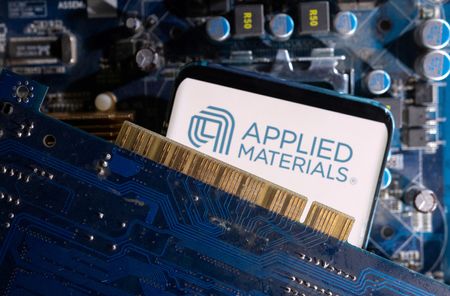By Karen Freifeld
(Reuters) -Semiconductor equipment maker Applied Materials is under U.S. criminal investigation for potentially evading export restrictions on China’s top chipmaker SMIC, according to three people familiar with the matter.
The largest U.S. semiconductor equipment maker is being probed by the Justice Department for sending equipment to SMIC via South Korea without export licenses, the sources said. Hundreds of millions of dollars of equipment is involved, one of the people said. Reuters is reporting details of the probe for the first time.
Shares in Applied Materials fell 7.3% after the news and the company reported quarterly results.
The U.S. has restricted shipments of advanced chips and chipmaking equipment to China for national security, and the Justice and Commerce departments launched a task force earlier this year to investigate and prosecute criminal violations of export controls. The rules are aimed at stemming the flow of U.S. technology that could be used to bolster China’s military and intelligence capabilities.
Santa Clara, California-based Applied Materials said Thursday it first disclosed in October 2022 that it had received a subpoena from the U.S. Attorney’s Office in Massachusetts for information on certain China customer shipments. “The company is cooperating with the government and remains committed to compliance and global laws, including export controls and trade regulations,” it said in a statement.
The U.S. Attorney’s office in Boston said: “We do not confirm or deny investigations.”
Prosecutors in the office’s National Security Unit are handling the ongoing probe, two sources said.
Reuters could not determine whether Applied Materials violated the law, and it isn’t clear whether the investigation will result in charges.
The company produced semiconductor equipment in Massachusetts, then repeatedly shipped the equipment from its plant in Gloucester to a subsidiary in South Korea, the people said. From there, the equipment went to China’s Semiconductor Manufacturing International Corporation (SMIC), the people, familiar with the probe, said.
The shipments began after the U.S. Commerce Department added SMIC to its “Entity List” in December 2020, which restricted exports of goods and technology to the company, two of the sources said, and took place in 2021 and 2022.
SMIC was placed on the list over its apparent ties to the Chinese military. SMIC did not immediately respond to a request for comment on the shipments from Applied Materials. In 2020, SMIC denied ties with the Chinese military, saying that it manufactures chips and provides services “solely for civilian and commercial end-users and end-uses.”
A spokesperson for the Commerce Department, which oversees export controls, declined comment. A spokesperson for China’s embassy in Washington was not aware of the Applied Materials probe. But Liu Pengyu, the spokesperson, said that, as a general principle, “imposed restrictions” are “at odds with market economy principles and fair competition.”
When asked about the probe, Mao Ning, a spokesperson for the Chinese foreign ministry, told a regular news briefing on Friday that the U.S. should stop disrupting the global semiconductor industry’s production and supply chain.
“China will pay close attention to relevant developments and resolutely safeguard its own rights and interests.”
SUBJECT TO UNCERTAINTIES
In adding SMIC to its trade blacklist in 2020, the Commerce Department said that licenses for equipment uniquely capable of producing chips at advanced technology nodes are likely to be denied to “prevent such key enabling technology from supporting China’s military modernization efforts,” according to a 2020 posting in the Federal Register.
Licenses for other items are subject to a case-by-case review, it added.
In March 2021, Reuters reported that the U.S. government had been slow to approve licenses for American companies like Lam Research Corp and Applied Materials to sell to SMIC.
“This matter is subject to uncertainties, and we cannot predict the outcome, nor reasonably estimate a range of loss or penalties, if any, relating to this matter,” the company said in an August 2023 filing with the U.S. Securities and Exchange Commission, in reference to its 2022 receipt of the subpoena relating to certain China customer shipments.
(Reporting by Karen Freifeld; Additional reporting by Liz Lee in Beijing; Editing by Anna Driver)



